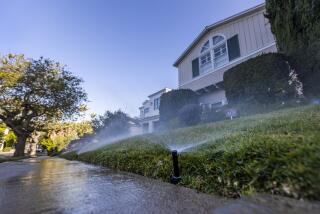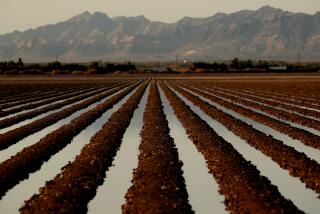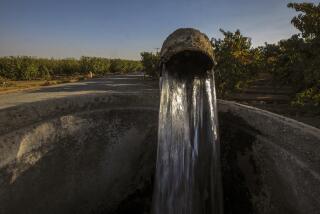Capitol Journal: Why do farmers get a free pass from Brown?
Gov. Jerry Brown is talking tough about cutting back water use, but he’s making one thing clear: He is not going to tell farmers what they can or cannot grow.
“I believe farmers should grow whatever they want,” he told me and a dinner companion at venerable Frank Fat’s restaurant near the Capitol about two weeks ago.
Brown stopped by briefly after dining with others and commented about crop regulation without being asked. Then he headed for the door.
Two days earlier, I had written a column suggesting it was time state government consider regulating crops based on their water demands and location — whether grown, for example, on the arid west side of the San Joaquin Valley or up north where it’s wetter. This is particularly true for permanent crops — orchards and vineyards — that cannot be fallowed during droughts as vegetables can.
Almonds are especially thirsty in the southern San Joaquin. But there’s a lucrative overseas market for them so growers have been planting more and more trees. Basically, one almond requires a gallon of water to produce.
Last week, Brown elaborated on his hands-off-crops position, starting at a Sierra photo op that made newspaper front pages and attracted national TV. Standing on bare ground where there’s normally snow, the governor unveiled his new drought-survival plan.
It includes tightening the spigot on lawns, golf courses and cemeteries, even digging up grass and substituting drought-resistant landscaping, letting road median strips go brown and junking old appliances.
“As Californians, we have to pull together and save water in every way we can,” the governor declared. “Overall, we’re looking for a 25% aggregate reduction....
“People should realize, we’re in a new era. The idea of your nice little green grass getting lots of water every day, that’s going to be a thing of the past.... In many parts of California, they’re living in a desert or semi-arid desert and we have to begin to live in more conformity to what nature makes available.”
But wait a second: He wasn’t demanding a 25% cut in overall water use. He was seeking 25% of 20% — equal to 5% of the total. His target is only the 20% of developed water that flows to urban use. Agriculture devours the other 80%.
Reporters asked, what about that?
“Agriculture has already suffered major cutbacks,” he replied. “A lot of people are letting their land go fallow. Trees are dying. Farmers have been hit very hard.”
True. Farmers without senior water rights — those granted prior to 1914 — are expecting no deliveries for the second straight year from the federal Central Valley Project. Growers supplied by the State Water Project will receive only 20% of requested deliveries. Last year, more than 400,000 acres were left unplanted.
Farmers have been trying to recapture the loss by over-pumping groundwater. The water table has been plunging and, in some areas, the land is sinking dramatically.
The governor last year signed a historic law to manage groundwater — we were the last Western state to do that — but it doesn’t have to be implemented for two decades.
Brown’s executive order last week did require irrigation districts to develop drought management plans and begin monitoring groundwater levels, reporting the numbers to Sacramento.
“So this will be somewhat of a burden” on farmers, the governor said.
Brown later was asked on PBS’ “NewsHour” why he didn’t focus more on agriculture. He replied that a government deciding which crops to allow is “Big Brother. Outside of war or unprecedented catastrophe, that shouldn’t even be considered.”
This does seem to be an unprecedented drought — Brown even says so — but never mind.
Brown’s state water director, Mark Cowin, who grew up on a San Joaquin Valley farm, echoed the governor’s sentiment when I talked to him. “Farming is a business,” he said. “How are we to judge” which crops should be grown?
How about by the amount of water they gulp? And government could regulate that business the way it does others, telling landowners what they can do with their property, whether it’s suitable for housing, a mall or a dump.
Yes, agriculture is a business, but it uses 80% of our water and accounts for only 2% of the state’s economy.
Cowin did acknowledge: “It troubles me to drive around and see new plantings of almonds.” But he added that those farmers “take the risk” financially.
They also might be taking the groundwater of their neighbors by drilling deeper.
But, Cowin continued, all bets are off if the drought drags on.
“I’ve been thinking about this a lot,” he said. “At the end of the day, if there’s a five- or 10-year drought, the state will use all the authority it has to redirect water from agriculture to the health and safety of urban users.”
Felicia Marcus, chairwoman of the state water board, which will write the details of Brown’s plan, also defends laying off agriculture.
“Agriculture water goes to growing food, which is important to urban areas,” she said. “Someone in L.A. may have more in common with a Central Valley farmer than the guy next door watering his lawn.”
What if the food isn’t consumed in L.A., but is exported to Asia? “We can’t be an island,” she said, “and only grow food for ourselves.”
But maybe we should if the drought lingers. Otherwise, with every shipped almond we also export a gallon of water.
Twitter: @LATimesSkelton
More to Read
Start your day right
Sign up for Essential California for news, features and recommendations from the L.A. Times and beyond in your inbox six days a week.
You may occasionally receive promotional content from the Los Angeles Times.







